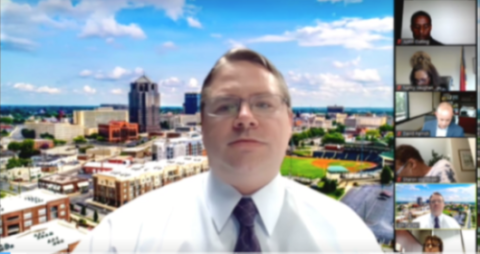In what has been touted as an “unprecedented” budget year, the Greensboro City Council showed no more interest in the budget than usual, in fact less than in 2019 when the economy was booming.
On Tuesday, May 26, the City Council held a virtual budget work session of a little more than an hour beginning at 3 p.m. Council work sessions are usually held in the Plaza Level Conference Room with the councilmembers and manager sitting around a conference table. It’s where in the past the City Council has had intense discussions on city policy and the city budget, but not in 2020.
Budget and Evaluation Director John Decker gave a presentation on City Manager David Parrish’s recommended budget. It was pretty much the same as Parrish’s presentation on the recommended budget at the Tuesday, May 19 City Council meeting and as the budget update given by Assistant City Manager Larry Davis at the May 5 City Council meeting.
Maybe it makes sense that the city councilmembers didn’t have many questions about the recommended budget, since this is the third time they have heard it. But the councilmembers didn’t have many questions the first or second time they heard it either.
The total city budget for 2020-2021 is estimated to be $612.5 million, which is an increase over the 2019-2020 budget of $580 million. The increase in the overall budget exists despite a projected drop in sales tax revenue from $58.5 million in 2019-2020 to an estimated $55 million in 2020-2021.
The estimate is that sales tax revenue will be down about 6 percent from what was projected last year at this time, which created a $7 million hole in the budget. But that lack of revenue is largely covered by delaying some maintenance projects, reducing the allocations to nonprofit agencies from $400,000 to $50,000 and postponing the participatory budgeting projects for a year for a savings of $535,000.
The Parks and Recreation Department budget was reduced by $240,000 and the libraries budget by $145,000.
There is no plan to touch the $28 million unappropriated fund balance, what the state calls “The Rainy Day Fund” and what some jurisdictions call their “emergency fund.” The state recommends that local governments keep a balance of at least 8 percent in the fund balance and Greensboro will continue to maintain 9 percent.
The budget does call for spending down the Capital Reserve Fund, which some have called a “slush fund.” When there is money left over at the end of the fiscal year and the 9 percent fund balance has been covered, the excess money goes in the Capital Reserve Fund.
In reality a majority of City Council can spend the Capital Reserve Fund on any legitimate city expense despite its name. This budget spends the Capital Reserve Fund down to $1.9 million.
No programs are being eliminated and no employees laid off.


No programs eliminated, and no lay offs. That summizes the entire article. We suffer lay offs and wage cuts, but the ever-expanding govt does not. They actually want more money to feather their nest. Anyone have any suggestions on how to stop sending them more money? Mass refusal to pay property taxes? Elect Libertarians into office? Any constitutional means at all?
Just shorten the title to read: “City Council doesn’t work much”. Double-entendre.